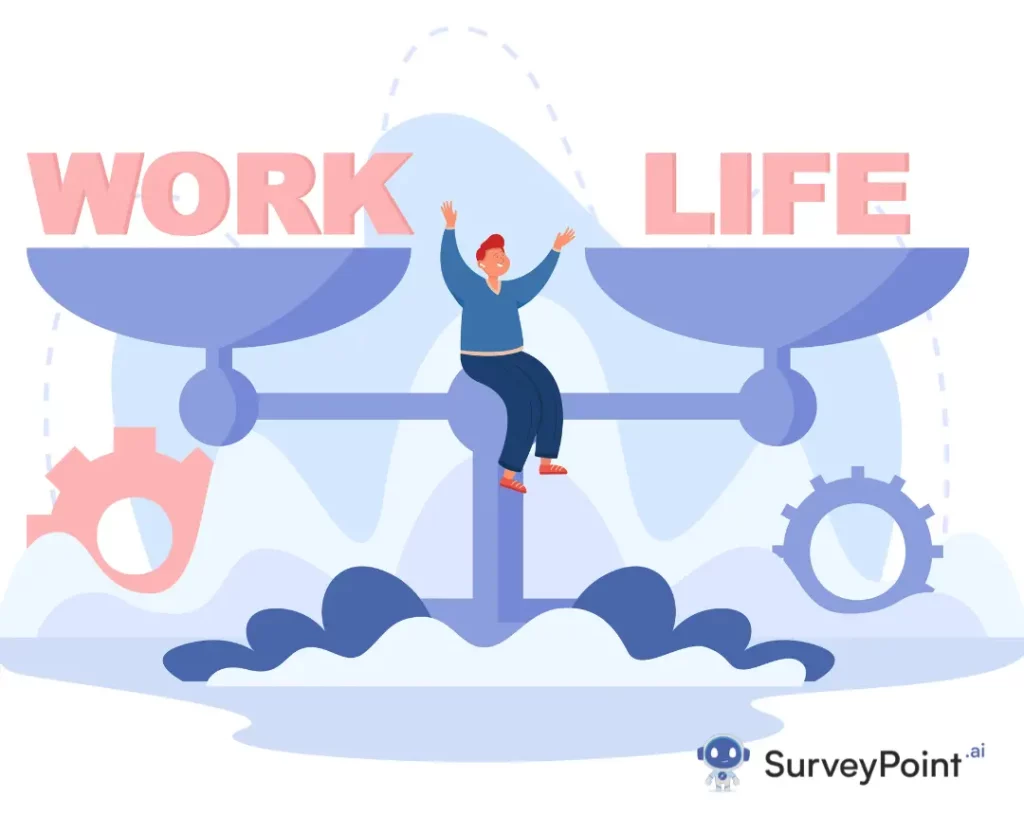
Work-life balance has become a buzzword in today’s fast-paced, competitive world, where the lines between personal and professional life often blur. It refers to the equilibrium between the demands of work and the need for personal time, ensuring individuals can lead fulfilling lives both inside and outside the workplace.
This blog will delve into the concept of work-life balance, its significance, reasons why it is crucial for individuals and organizations, along with practical tips to enhance this delicate equilibrium.
What is Work-Life Balance?
Work-life balance is a state where individuals can effectively manage their professional responsibilities without compromising their personal lives. It involves allocating time and energy to work, family, and personal pursuits in a way that promotes overall well-being and prevents burnout. Achieving a healthy work-life balance is a dynamic process that varies for each person, considering their unique circumstances, values, and priorities.
How Important is Work-Life Balance?
- Mental and Physical Well-being:
Achieving work-life balance is essential for maintaining good mental and physical health. Continuous stress and overworking can lead to burnout and various health issues, highlighting the importance of taking time for personal activities and relaxation. - Enhanced Job Satisfaction:
Individuals who can balance work and personal lives tend to experience higher job satisfaction. This satisfaction contributes to a positive mindset, increased motivation, and a greater sense of fulfillment in one’s professional life. - Improved Productivity and Performance:
Maintaining a balance between work and personal life has been linked to higher levels of focus and efficiency during working hours. This results in improved job performance, demonstrating the direct impact of work-life balance on overall productivity. - Better Relationships:
Balancing work and personal life allows individuals to invest time in building and maintaining relationships with family and friends. Strong social connections contribute to emotional well-being and provide a crucial support system during challenging times. - Reduced Burnout and Stress:
Achieving work-life balance helps prevent burnout and reduces stress levels. Consistently working long hours without breaks can lead to fatigue and diminish the quality of work. Balance allows for periods of rest and recovery, fostering a healthier and more sustainable work environment.
Tips to Improve Work-Life Balance
- Set Clear Boundaries:
Establish distinct boundaries between work and personal life. Clearly define work hours and avoid engaging in work-related activities during personal time. This helps create a separation, preventing work from encroaching on precious personal moments. - Prioritize Self-Care:
Make self-care a priority by scheduling regular breaks, engaging in activities you enjoy, and maintaining a healthy work-life routine. Prioritizing your well-being ensures you have the energy and resilience to meet both professional and personal demands. - Effective Time Management:
Practice efficient time management by prioritizing tasks, setting realistic deadlines, and avoiding procrastination. This allows you to streamline your workload, reducing stress and creating space for personal activities. - Utilize Technology Wisely:
While technology offers flexibility, it’s crucial to set boundaries. Avoid constant connectivity to work by establishing specific times for checking emails and messages. This helps create a healthier relationship with technology and prevents it from dominating personal time. - Reflect and Adjust:
Regularly reflect on your work-life balance and be willing to make adjustments based on changing circumstances. Flexibility and adaptability are key in maintaining a sustainable balance that aligns with your evolving priorities and needs.
Benefits of Work-Life Balance
Work-life balance is essential for maintaining overall well-being and ensuring a harmonious integration of professional and personal aspects of life. The benefits of achieving a healthy work-life balance extend to individuals, their families, and organizations. Here are some key benefits:
Improved Mental Health:
Maintaining a work-life balance reduces stress and prevents burnout, leading to improved mental health. It allows individuals to recharge and approach work with a refreshed mindset.
Enhanced Physical Health:
Chronic stress and overworking can contribute to various health issues. Achieving work-life balance promotes better physical health by allowing individuals to engage in regular exercise, get adequate sleep, and adopt healthier lifestyle choices.
Increased Job Satisfaction:
Employees who can balance their work and personal lives are generally more satisfied with their jobs. Job satisfaction is crucial for employee retention and overall workplace morale.
Greater Productivity:
Contrary to the belief that longer hours equate to increased productivity, maintaining a balance between work and personal life has been linked to higher levels of focus and efficiency during working hours. Employees are more likely to produce quality work when they are well-rested and emotionally balanced.
Positive Organizational Culture:
Organizations that prioritize work-life balance contribute to a positive organizational culture. This culture, in turn, attracts and retains top talent, fostering an environment where employees feel valued and supported.
Improved Relationships:
Balancing work and personal life allows individuals to invest time in building and maintaining relationships with family and friends. Strong social connections contribute to emotional well-being and provide a support system during challenging times.
Reduced Absenteeism:
Employees with a healthy work-life balance are less likely to experience burnout or health-related issues, leading to reduced absenteeism. This benefits both individuals and organizations by maintaining a consistent and reliable workforce.
Enhanced Creativity and Innovation:
Taking time away from work to engage in personal activities fosters creativity and innovation. Exposure to diverse experiences outside of the workplace can inspire new ideas and perspectives.
Attractive Employer Branding:
Companies that prioritize work-life balance are seen as attractive employers. This positive reputation helps in attracting top talent and contributes to a strong employer brand in the industry.
Employee Loyalty and Retention:
When employees feel that their personal lives are respected and supported, they are more likely to stay with the organization for the long term. This loyalty reduces turnover rates and the costs associated with recruitment and training.
Increased Employee Engagement:
A balanced work-life schedule contributes to higher levels of employee engagement. Engaged employees are more committed to their work, leading to a more productive and collaborative work environment.
Improved Decision-Making:
Adequate time away from work allows individuals to clear their minds and approach challenges with a fresh perspective. This, in turn, enhances decision-making abilities both in personal and professional contexts.
Workforce Diversity and Inclusion:
Companies that value work-life balance are often more inclusive and diverse. This is because they attract individuals with various backgrounds and life circumstances who feel supported in achieving a balance between their professional and personal lives.
Positive Impact on Employee Morale:
A workplace that encourages work-life balance contributes to positive employee morale. Employees are more likely to feel motivated and satisfied, creating a positive atmosphere within the organization.
Long-term Career Success:
Individuals who prioritize work-life balance are more likely to experience sustained career success. By avoiding burnout and maintaining a healthy balance, they can navigate their careers more effectively and achieve long-term professional goals.
Conclusion
Achieving work-life balance is not a one-size-fits-all endeavor but rather a personalized journey that requires constant assessment and adjustment. Recognizing the importance of work-life balance is the first step towards creating a more fulfilling and sustainable life, both personally and professionally. By implementing practical tips and understanding the benefits, individuals and organizations can work together to create environments that foster well-being, productivity, and long-term success.




